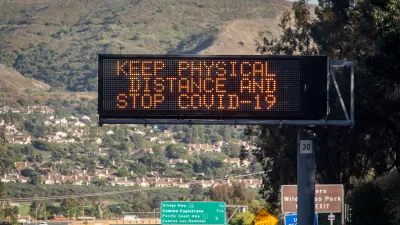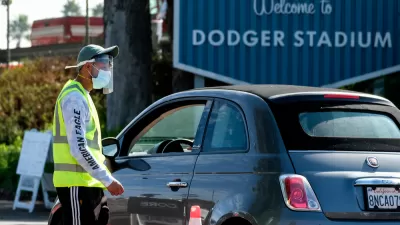The greater Bay Area is enjoying a substantial increase in road maintenance funding from local measures, like bonds, city and county sales taxes, and development fees, part of a growing trend in compensating for a shortage of state gas tax funds.
In the absence of a state gasoline excise tax that has not effectively been raised since 1994 (notwithstanding a complex 2010 gas tax swap), many California cities and counties have had to rely on self-generated revenues, though none come from driver user fees. The trend is particularly prevalent in affluent Bay Area cities and counties.
"From the East Bay to Silicon Valley to San Francisco, local agencies will be spending up to four to five times more for road maintenance in the coming years than they were just a couple of years ago," writes Gary Richards, a.k.a. Mr. Roadshow of the San Jose Mercury News. "(I)t's a reversal of the trend over the past two decades, when the mantra was 'we have no money' to fix roads.
San Francisco was among the first to go to voters for new funding for roadwork, passing a $248 million bond measure four years ago. But few cities are spending as much as San Jose will this year, where the usual $20 million will jump to $55 million thanks to a grant and [$24 million in one-time] development fees.
A sizable chunk will come annually for decades through county sales tax measures that stretch for 30 or more years in Alameda and Contra Costa counties. [See "The Biggest Transportation Winner on the Nov. 4 Ballot]. And a number of cities, such as Santa Cruz, Orinda, Moraga and El Cerrito, have passed tax measures to fix their roads.
Richards goes on to mention which Bay Area cities will increase road funding, by how much, and from what sources. The trend will continue as "Santa Clara County is expected to put a sales tax measure on the ballot next year, and pothole repairs will likely be high on the list of work," he notes.
Hat tip to MTC-ABAG Library
FULL STORY: Bay Area cities will see millions of dollars more for pothole repairs

Study: Maui’s Plan to Convert Vacation Rentals to Long-Term Housing Could Cause Nearly $1 Billion Economic Loss
The plan would reduce visitor accommodation by 25,% resulting in 1,900 jobs lost.

Alabama: Trump Terminates Settlements for Black Communities Harmed By Raw Sewage
Trump deemed the landmark civil rights agreement “illegal DEI and environmental justice policy.”

North Texas Transit Leaders Tout Benefits of TOD for Growing Region
At a summit focused on transit-oriented development, policymakers discussed how North Texas’ expanded light rail system can serve as a tool for economic growth.

Paris Bike Boom Leads to Steep Drop in Air Pollution
The French city’s air quality has improved dramatically in the past 20 years, coinciding with a growth in cycling.

Why Housing Costs More to Build in California Than in Texas
Hard costs like labor and materials combined with ‘soft’ costs such as permitting make building in the San Francisco Bay Area almost three times as costly as in Texas cities.

San Diego County Sees a Rise in Urban Coyotes
San Diego County experiences a rise in urban coyotes, as sightings become prevalent throughout its urban neighbourhoods and surrounding areas.
Urban Design for Planners 1: Software Tools
This six-course series explores essential urban design concepts using open source software and equips planners with the tools they need to participate fully in the urban design process.
Planning for Universal Design
Learn the tools for implementing Universal Design in planning regulations.
Smith Gee Studio
Alamo Area Metropolitan Planning Organization
City of Santa Clarita
Institute for Housing and Urban Development Studies (IHS)
City of Grandview
Harvard GSD Executive Education
Toledo-Lucas County Plan Commissions
Salt Lake City
NYU Wagner Graduate School of Public Service





























